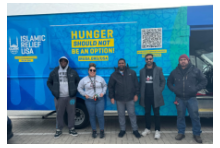OVERVIEW
The IRUSA Food Truck program is a part of the IRUSA Food Security portfolio. Its aim is to address food insecurity by providing access and availability to hot nutritious meals. In its pilot run, this program will replace the IRUSA hot meal project that is currently operating in Chicago, Detroit and New York. Instead of engaging vendors to deliver meals to the host site, IRUSA will now be distributing meals via food trucks.
In addition to addressing food insecurity in major metropolitan areas, the IRUSA food trucks are also designed for emergency functions. Currently, the IRUSA Disaster Management Team (DMT) is working on establishing a feed program after the impact of disasters. The food trucks will also be integrated into this program. The intent is that during times of emergency, the DMT team can activate the trucks to assist with feeding operations at either a shelter or emergency operations centers (EOC).
The following populations will be served by this project. Each of these groups have unique challenges and the food truck program will allow IRUSA to provide targeted food distributions to these populations:
Low-Income Households
Homeless Populations
Children and Youth
Seniors
Rural Communities
Urban Populations in Food Deserts
Immigrant and Refugee Communities
Persons with Disabilities
Veterans
Disaster-Affected Populations
BACKGROUND OF FOOD INSECURITY IN THE UNITED STATES
According to the USDA Economic Research Service (ERS), food insecurity in the United States rose significantly in 2023, with 13.5% of households, equivalent to 17.5 million, experiencing food insecurity. This is an increase from 12.8% in 2022. Among these households, 5.1% (6.8 million) faced very low food security, meaning normal eating patterns were disrupted due to lack of resources. Food insecurity disproportionately affected single-parent households, particularly those headed by women, and minority communities, with Black and Latino households reporting rates of 23.3% and 21.9%, respectively, compared to 9.9% for white households. Inflation, the rollback of pandemic-era support programs, and systemic inequities have contributed to these rising rates, underscoring the need for immediate and long-term interventions
Food insecurity is likely to persist in the United States due to structural economic disparities, including wage stagnation and the rising cost of living, which outpaces income growth for low-income families.
There are four key areas that need to be addressed to ensure that families are food secure:
Availability - there should be sufficient food at all times.
Accessibility - there must be physical and economic access to food at all times.
Utilization- the food must address a person’s nutrition.
Sustainability - food should be accessible for both present and future generations.
IMPACT STATEMENT
IRUSA will provide food accessibility and availability for vulnerable populations in three metropolitan areas through a mobile food truck model. The IRUSA Food Truck Program will address the dual challenges of hunger and access to culturally appropriate meals, particularly for underserved communities. By offering convenient, affordable, and nutritious halal-certified options, it will fill a gap often unmet by traditional food banks or pantries, fostering inclusion and equity in food access.
The IRUSA Food Truck program will accomplish the following:
Strengthen the food security network: By providing halal meals in metropolitan areas, the program expands the food security infrastructure, complementing traditional resources like food banks and pantries. This strengthens local food systems and enhances access to nutritious meals for underserved communities
Engage local residents as volunteers: The program fosters community involvement by encouraging residents to volunteer, helping them build a deeper connection to addressing food insecurity while developing skills and networks within their neighborhoods:
Increase awareness and public recognition: As the food truck moves through diverse neighborhoods, it raises awareness of food insecurity and highlights the need for culturally appropriate solutions.
Increased visibility helps build recognition and advocacy for food justice and inclusivity
